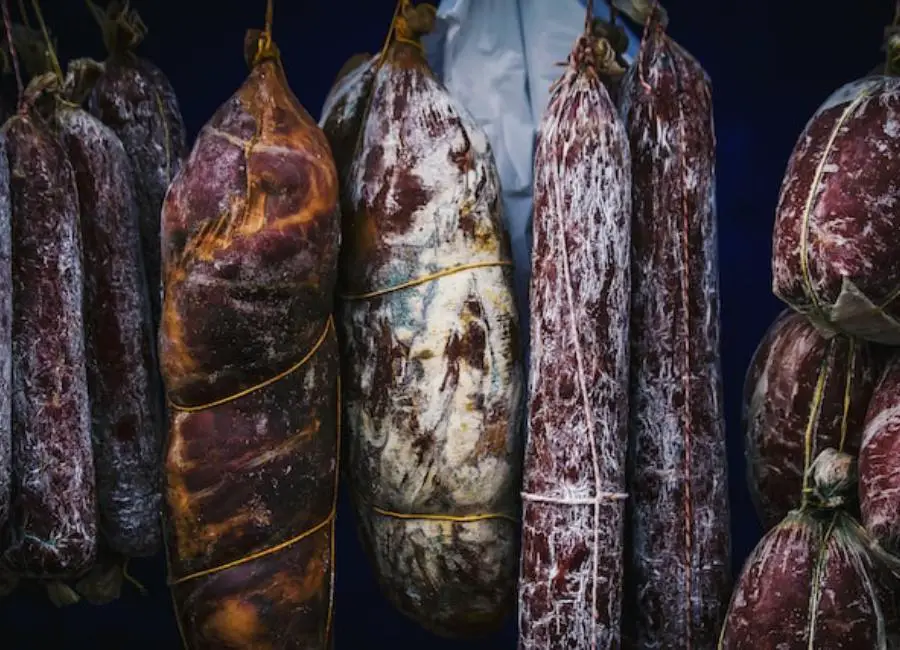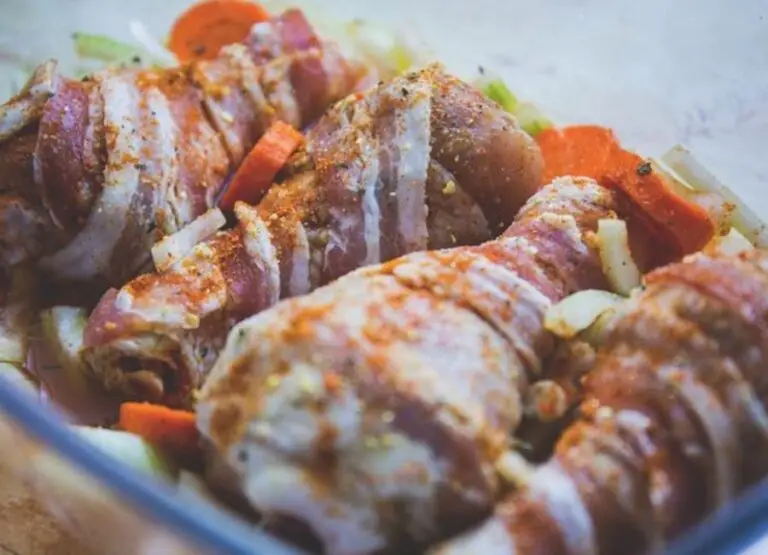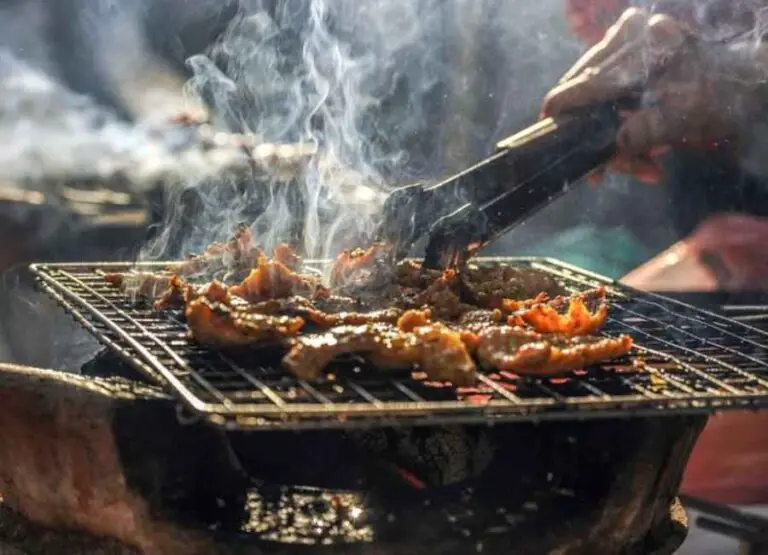How Long Can Smoked Meat Sit Out [Explained]
Whether you’re planning to host a backyard BBQ or just enjoy some savory meat snacks, you may be wondering how long smoked meat can sit out before it’s no longer safe to eat.
After all, you don’t want to give your guests or yourself food poisoning!
In this blog post, we’ll explore this important question and provide some expert tips on how to keep your smoked meat fresh and tasty.
How Long Can Smoked Meat Sit Out
Smoked meat that has been cooked and left out at room temperature should not be consumed if it has been sitting out for more than 2 hours.
This is because harmful bacteria can grow rapidly in the “danger zone” temperature range of 40-140 degrees Fahrenheit, which can lead to foodborne illness.
It’s important to refrigerate any leftover smoked meat within 2 hours of cooking to minimize the risk of bacterial growth.
However, the exact length of time that smoked meat can sit out and remain safe to eat depends on a variety of factors, including the type of meat, the specific method of preparation, and the storage conditions.
When in doubt, it’s always best to err on the side of caution and discard any food that has been left out for an extended period of time.
Recommended time smoked meat can sit out
It is generally recommended that smoked meat should not be left out at room temperature for more than two hours.
After this time, harmful bacteria can start to grow on the meat, increasing the risk of foodborne illness.
To ensure food safety, it is best to refrigerate smoked meat as soon as it has cooled down.
If you are planning to serve the meat at a later time, you can keep it refrigerated for several days.
Alternatively, you can freeze the meat for longer storage.
It’s important to remember that smoked meat, like any other food, has a limited shelf life and should be consumed or properly stored before it spoils.
Factors affecting the time smoked meat can sit out
Here are some common factors affecting the time smoked meat can sit out:
- Temperature: The temperature at which the meat is stored is one of the most important factors. If the meat is kept at a temperature between 40°F (4°C) and 140°F (60°C) for more than 2 hours, it can become unsafe to eat.
- Type of meat: Different types of meat have different moisture contents and bacteria levels. As a general rule, poultry and ground meats are more susceptible to spoilage than beef or pork.
- Humidity: High humidity can promote the growth of bacteria, which can cause the meat to spoil faster.
- Airflow: Good airflow can help to keep the temperature and humidity levels stable, which can help to prolong the shelf life of the meat.
- Salt content: Smoked meats are often high in salt, which can act as a preservative and extend the shelf life of the meat.
- Fat content: The fat content of the meat can also affect its storage life, as fat can go rancid over time.
- pH level: The pH level of the meat can also play a role in its storage life, as acidic meat is less hospitable to bacteria than alkaline meat.
- Smoking method: The method used to smoke the meat can also affect its storage life. For example, meats that are cold-smoked may be more susceptible to spoilage than meats that are hot-smoked.
- Type of wood used: The type of wood used in the smoking process can also affect the shelf life of the meat, as some woods can introduce bacteria or mold into the meat.
- Contamination: Smoked meats can become contaminated during the smoking process or during storage, which can cause them to spoil more quickly. It is important to follow proper food handling and storage practices to prevent contamination.
Learn more about how much-smoked meat can be safe to eat.
How to Properly Store Smoked Meat
After smoking meat, it is important to store it properly to maintain its quality and safety.
One way to store smoked meat is to vacuum seal it, which helps to preserve the smoke flavor and extend the shelf life.
Another method is to refrigerate or freeze the smoked meat as soon as possible after it has finished smoking.
Wrap the smoked meat tightly in plastic wrap to prevent air from getting in and to reduce freezer burn.
Store the smoked meat in the fridge for up to 4 days or in the freezer for up to 3 months.
It is not recommended to keep smoked meat in the freezer for more than three months.
When thawing smoked meat, it is best to do so in the refrigerator and cook or refreeze it within one or two days.
Keep in mind that when reheating the smoked meat, make sure it is heated to 165 °F to kill any bacteria that may have grown.
When reheating the smoked meat, add a little bit of moisture by wrapping it in foil or heating it with a small amount of fruit juice or broth to prevent it from drying out.
Learn more about how to know a smoked meat has gone bad.
Tips for Properly Storing Smoked Meat
Here are some common tips for properly storing smoked meat:
- Cool it down quickly: After smoking the meat, you should cool it down quickly to prevent bacterial growth. You can do this by putting it in a cold water bath or placing it in the refrigerator.
- Wrap it properly: Once the meat is cooled, you should wrap it tightly with plastic wrap or aluminum foil to prevent air from getting in and causing freezer burn.
- Label and date it: Make sure to label the meat and include the date it was smoked. This will help you keep track of how long it has been stored and when it needs to be consumed.
- Keep it in the fridge or freezer: Smoked meat should be stored in the fridge for up to a few weeks or in the freezer for up to six months. Be sure to store it in the proper temperature as meats left at room temperature for more than two hours can cause foodborne illness.
- Store in airtight containers or bags: Using airtight bags or containers helps protect against freezer burn and keeps moisture from getting into the meat.
- Store safely: Keep the smoked meats away from other items in the fridge/freezer to prevent potential contamination.
- Thaw safely: If you plan on thawing frozen smoked meat, do it safely by leaving it in the fridge overnight, in cold water, or defrosting it in the microwave before cooking it.
- Reheat properly: When reheating smoked meat, make sure it reaches an internal temperature of 165°F to kill any bacteria.
- Inspect before eating: Double-check if the color, texture, and smell of the meat are still normal, and avoid eating if something seems off.
Learn more about the reasons smoked meat gives you indigestion.
Dangers of Eating Improperly Stored Smoked Meat
Here are some common dangers of eating expired or improperly stored smoked meat:
- Bacterial growth: Smoked meat can be a breeding ground for bacteria, and when it is not stored properly, these bacteria can multiply rapidly, leading to the risk of food poisoning.
- Botulism: This type of food poisoning is caused by toxins produced by Clostridium botulinum bacteria which can grow in an airless environment like vacuum-sealed smoked meats. Botulism can lead to paralysis and even death.
- Toxoplasmosis: This is a parasitic infection that can be contracted through eating undercooked or raw smoked meat infected with the Toxoplasma gondii parasite. Pregnant women are particularly at risk, as this infection can lead to birth defects in their babies.
- Listeria: This bacteria is commonly found in smoked meat products and can cause serious illness, particularly in pregnant women, the elderly, and people with weakened immune systems.
- Salmonella: This bacteria is often found in poultry and can be present in improperly stored smoked meat products that contain poultry. Symptoms of salmonella infection include diarrhea, fever, and abdominal cramps.
- Staphylococcus aureus: This bacteria can cause food poisoning and is commonly found on the skin and in the nasal passages of healthy people. It can grow in smoked meat that is not stored properly.
- Mold: Smoked meat that is not stored properly can also develop mold. This can pose a risk to people who are allergic to mold or who have respiratory problems.
- Chemical contamination: Improperly stored smoked meat can also have chemical contaminants such as nitrates that can be harmful to human health.
- Reduced quality: Even if expired or improperly stored smoked meat does not cause illness, it may have an unpleasant taste, texture, or appearance, which could make it unpalatable to eat. It is always best to consume fresh, properly stored smoked meats.
Learn more about some common tips for smoking meat in the rain.
Conclusion
In conclusion, smoked meat should not be left out for more than two hours at room temperature to avoid the growth of harmful bacteria.
It’s always better to be safe than sorry when it comes to food safety.
So, enjoy your smoked meat, but make sure to store it properly and keep it at the right temperature to avoid any health risks.







![Are Sausages Good For You [Useful Hints]](https://foodcreeks.com/wp-content/uploads/2023/02/Are-Sausages-Good-For-You-1-768x555.jpg)
